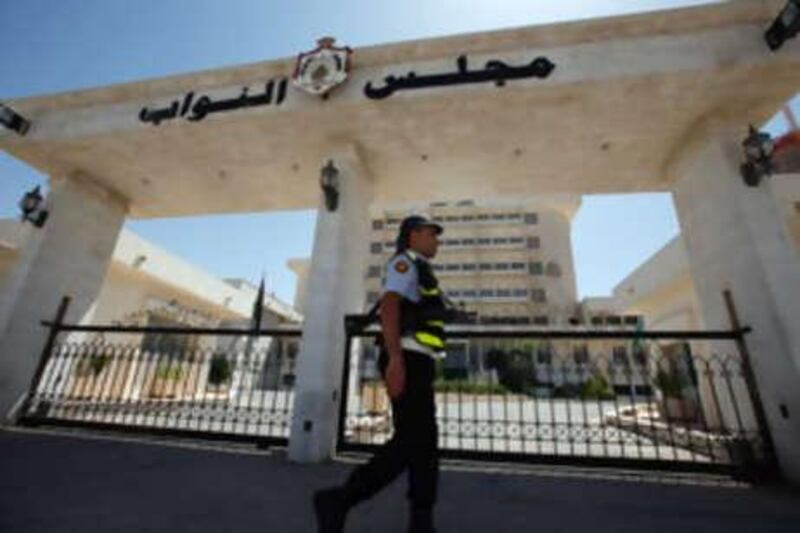AMMAN // An election law that went into effect last week guarantees free and fair parliamentary elections, according to Jordan's government, but critics say it falls far short of long-desired reforms. The law was endorsed by royal decree on May 20, seven months after King Abdullah dissolved parliament halfway through its four-year term. It raised the number of seats to 120 from 110 and doubled the number of parliamentary seats reserved for women to 12.
Also, for the first time, judges will oversee the voting process. The next legislative elections are expected to take place this year. The law punishes those found guilty of selling or buying votes with a prison term of up to seven years. What civic institutions, reformist journalists, professional associations and Islamist politicians remain opposed to is the one man-one vote formula, which in 1993 replaced a system whereby voters were entitled to as many votes as there were parliamentary seats allocated for their district.
Critics say the formula deepens tribalism and favours government loyalists because voters are more likely to vote for a fellow tribesman whereas in the past there was a greater chance the votes could be spread out among the different open seats. The government claims that the new law represents true political reform in its drive to democratisation, begun in 1989. "The amendments were only cosmetic and there is no real change in the electoral system," Mohammad Masri, a researcher at the centre of strategic studies at the University of Jordan, said. "The only change is that the government divided the existing constituencies into virtual electoral zones."
"The electoral system should be a tool to re-engineer society because it is already divided into tribes and citizens based on their country of origin, so the current system will only strengthen these divisions," Mr Masri said. "It is sending a message to the public to return to their sub-identities and their tribal affiliation." A member of a prominent tribe can run in the constituency where he comes from and guarantee the votes of his tribe, Mr Masri said.
The government, however, defended itself against criticism and said changes to the voting formula would have needed more time and would delay the parliamentary elections. The minister of interior, Nayef Qadi, said last week in a press conference that a ministerial committee "saw that dividing the kingdom into individual constituencies with one parliamentary seat for each constituency would ensure justice among voters".
"The committee took into consideration all views and proposals made by some parties, organisations, research centres, writers, political figures and responded to the approach of the majority of Jordanians," he said. In 1993, the government introduced the one-man voting system to curb the influence of the country's Islamists one year before it signed a peace treaty with Israel. Even before the new law was endorsed, the Muslim Brotherhood criticised it and said it was an indication of a lack of will for political reform.
"The government's insistence on the one-man one-vote system ? [shows] it is incapable of producing a political environment that can handle the country's problems," Hammam Saeed, the Brotherhood's leader, said. But some analysts suggested that the Islamists are likely to benefit from the government's measure to partition multi-member constituencies into one-member subdistricts. "In this way they can choose their rivals, and will compete against weaker ones," Nabeel Gheishan, an editor and columnist with Arab Alyawm, an independent daily based in Amman. "In the district where an Islamist candidate will run, no one will dare to compete with him and that's why they will be competing against weak rivals. They can choose their rivals. But it is unlikely that they will make substantial gains. The one-man one-vote formula has always curbed their influence."
The amendments to the election law come at a time of regional uncertainty. The lack of progress with the Arab-Israeli peace process is already casting its dark shadow, and Jordan remains concerned that Palestinians will be resettled here permanently and then ask for political representation that matches their numbers. But in response to western pressure, the government increased the number of seats by four in the densely populated cities of Amman, Zarqa and Irbid, where Jordanians of Palestinian origin were said to be under-represented.
"The government gave them a few seats as a tactic to ward off external pressure on Jordan," Mr Gheishan said. "Jordan has a clear strategy and is keen to maintain the demographics ? particularly with Israeli calls to resettle and transfer the Palestinians to Jordan, which could change the balance of power in Jordan. "The country has maintained the status quo regarding the voting formula because it wants to see what will happen to the Palestinian issue."
@Email:smaayeh@thenational.ae





